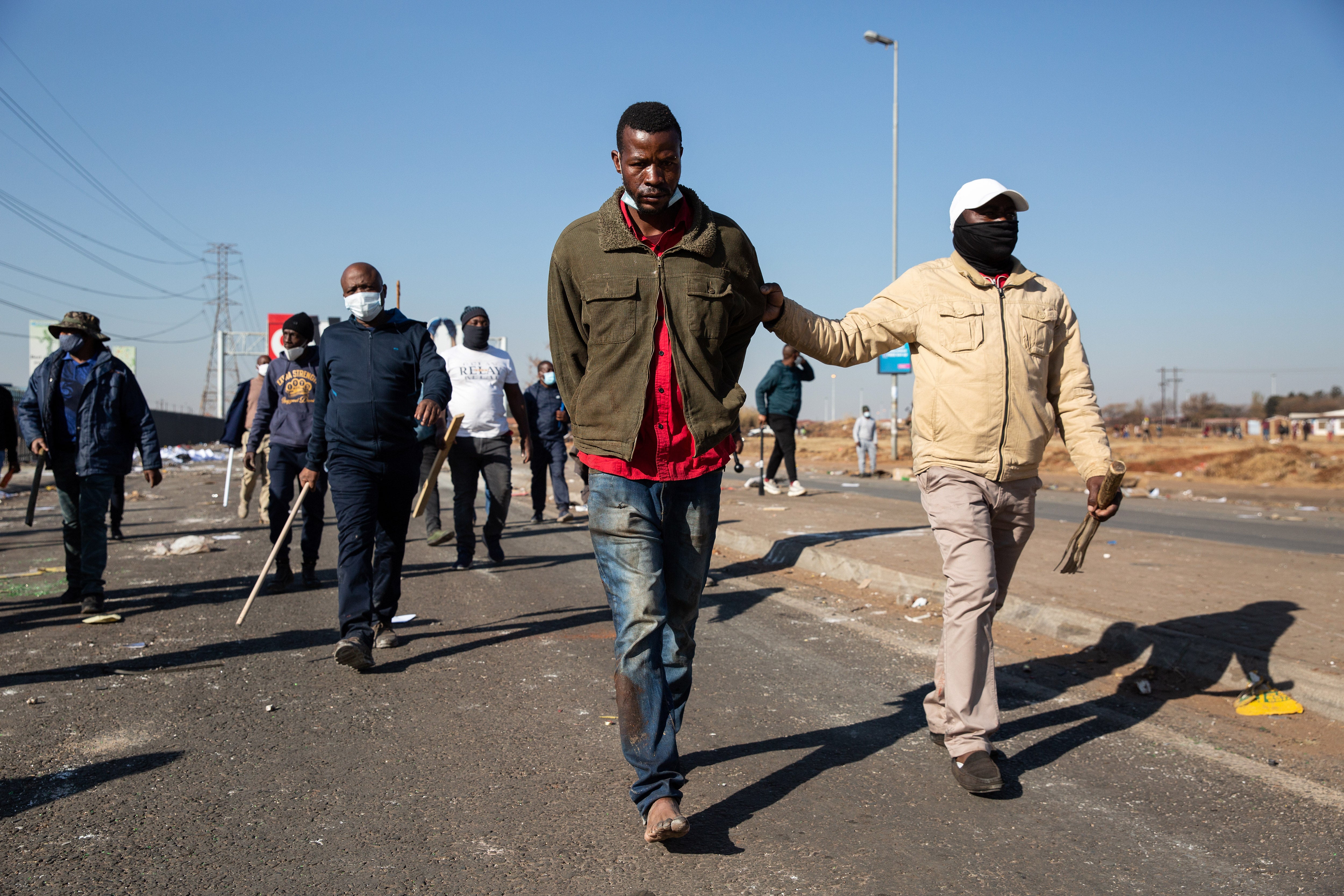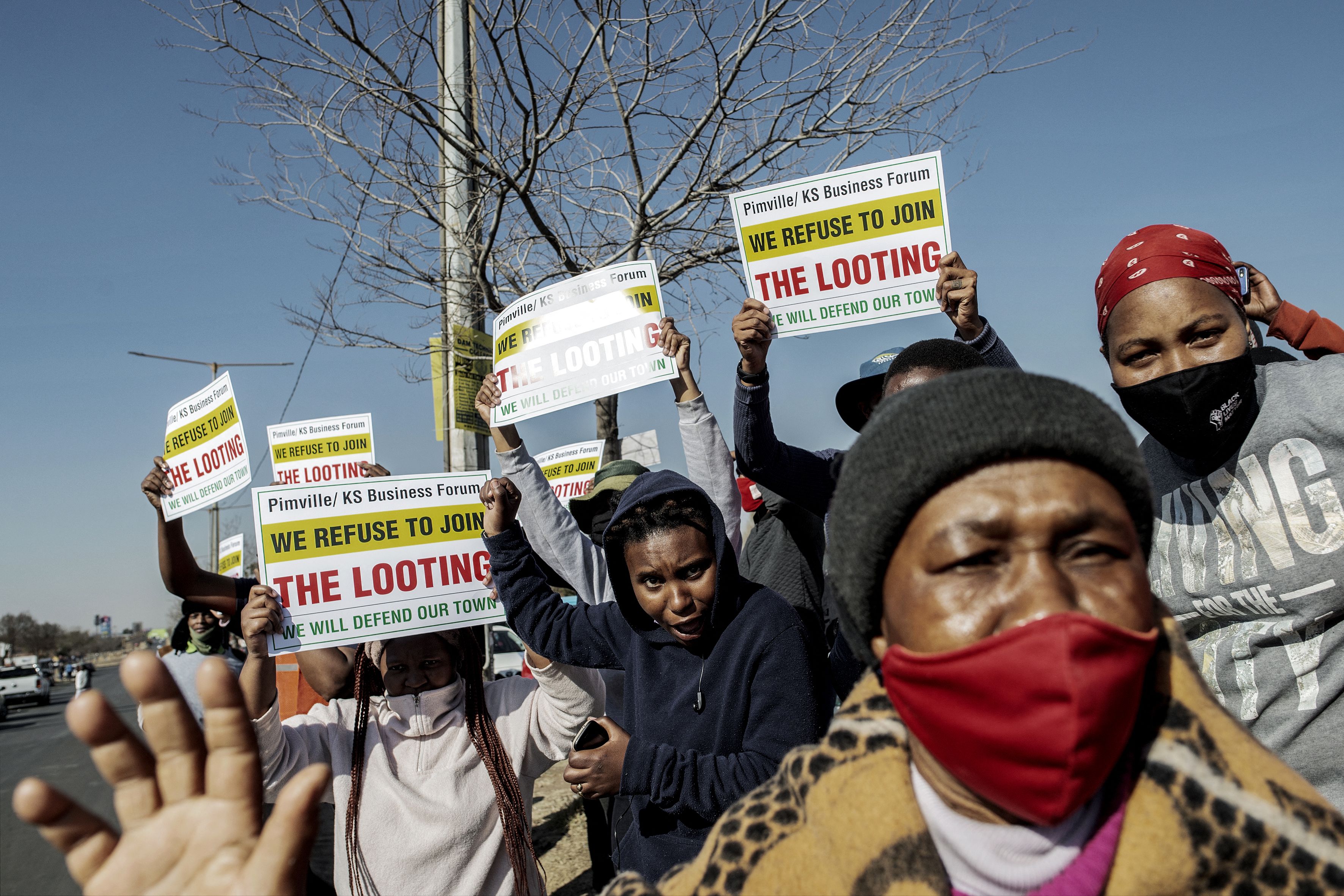Vigilantes take to South Africa’s streets as death toll from looting and violence rises to 72
‘This time is bad. Looters are even looting from each other’

Your support helps us to tell the story
From reproductive rights to climate change to Big Tech, The Independent is on the ground when the story is developing. Whether it's investigating the financials of Elon Musk's pro-Trump PAC or producing our latest documentary, 'The A Word', which shines a light on the American women fighting for reproductive rights, we know how important it is to parse out the facts from the messaging.
At such a critical moment in US history, we need reporters on the ground. Your donation allows us to keep sending journalists to speak to both sides of the story.
The Independent is trusted by Americans across the entire political spectrum. And unlike many other quality news outlets, we choose not to lock Americans out of our reporting and analysis with paywalls. We believe quality journalism should be available to everyone, paid for by those who can afford it.
Your support makes all the difference.South Africans took the law into their own hands on Wednesday as deadly violence which has seen more than 70 people killed and widespread looting across the country in the past few days continued.
In signs of a growing public backlash, anxious and scared residents in some areas armed themselves as vigilantes to form road blocks or scare looters away, despite the presence of armed police and soldiers on the streets.
Other residents blocked entrances to malls and turned suspected rioters over to the police in an attempt to stem the violence gripping the country.
In Vosloorus, southern Johannesburg, minibus taxi operators, many of whom have guns, fired bullets into the air to scare off looters.
“We can’t just allow people from nowhere to come and loot here,” said Paul Magolego, Vosloorus taxi association spokesperson, adding that taxi drivers had had no business since Monday because of the unrest.
Citizens armed with guns, many from South Africa’s white minority, blocked off streets to prevent further plundering, in Durban, reported Reuters. Some rich Durban residents chartered small planes and helicopters out of the city.
The country’s police minister, Bheki Cele, said he was fine with people helping the authorities but not if they turned to violence.
“The problem starts when they go for parallel structures; they go themselves and shoot the people and all that,” he said.
As many as 72 people have been killed in violence and rioting in South Africa which erupted after the jailing of the former president Jacob Zuma last week after he failed to appear at a corruption inquiry. More than 1,200 people have been arrested.
Looters have ransacked shops and businesses, and stopped a refinery from working on Wednesday, ignoring calls by security officials to stop. Supporters of the ex-president have also blockaded roads, disrupting major supply chains.
Footage even emerged of people rushing to save a toddler trapped inside a Durban department store which had been looted and then set on fire.
President Cyril Ramaphosa has called the violence “unprecedented”.
There was widespread looting in several cities, from Zuma’s home in KwaZulu-Natal province to Johannesburg and the surrounding Gauteng province.
“This time is bad. We aren’t safe to walk around the streets. Looters are even looting from each other,” locals in Johannesburg told South Africa’s TimesLive news site.
Though triggered by Zuma’s imprisonment, the unrest apears to reflect growing frustration at failures by the ruling African National Congress to address inequality decades after the end of white minority rule in 1994 ushered in democracy.
“It’s not about Zuma, it’s about poverty,” a man who gave his name as Elijah said, as soldiers confiscated stolen items from his house in Alexandra.
“I grabbed things I could take like those cold drinks and some paint. I guess the real reason is because we actually have nothing.”
Video footage on Wednesday showed the looting of shops spreading to the county’s biggest township Soweto, the former home of Nelson Mandela, and the port city of Durban.
Durban appears to have suffered heavily from the escalation of chaos. Footage on social media showed Lenmed hospital, located in the northern section of the city, in flames.

The mayor of Ethekwini, a municipality that includes Durban, estimated that 15 billion rand (almost £1bn) had been lost in damage to property and as much again in loss of stock.
In several places across the country, ATMs, restaurants, stores selling alcohol and clothing shops were all left empty.
Covid-19 has hit the South African economy badly, with GDP plummeting by about five per cent by the end of 2020. According to the country’s statistics agency, unemployment stood at a staggeringly high level of 32.6 per cent in the first quarter of 2021.
The National Hospital Network (NHN), representing 241 public hospitals already under strain from Africa’s worst Covid-19 epidemic, said it was running out of oxygen and drugs, most of which are imported through Durban, as well as food.
Zuma, 79, was sentenced last month for defying a court order to give evidence at an inquiry investigating high-level looting during his nine years in office until 2018.
He has pleaded not guilty in a separate case on charges including corruption, fraud, racketeering and money laundering.
Join our commenting forum
Join thought-provoking conversations, follow other Independent readers and see their replies
Comments